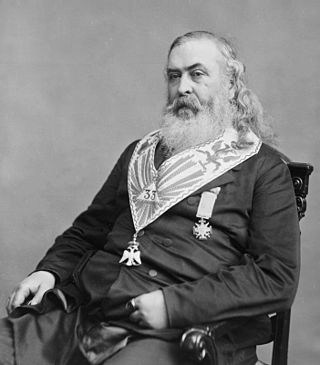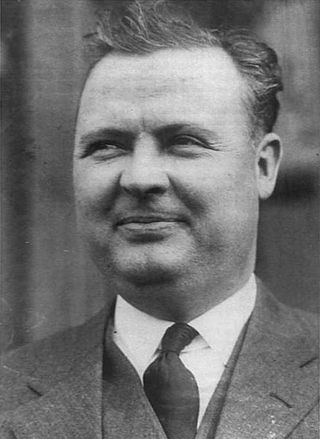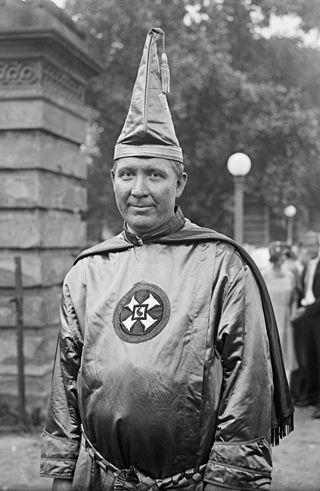
Albert Pike was an American author, poet, orator, editor, lawyer, jurist and Confederate States Army general who served as an associate justice of the Arkansas Supreme Court in exile from 1864 to 1865. He had previously served as a senior officer of the Confederate States Army, commanding the District of Indian Territory in the Trans-Mississippi Theater. A prominent member of the Freemasons, Pike served as the Sovereign Grand Commander of the Supreme Council, Scottish Rite from 1859 to 1891.

The Ku Klux Klan, commonly shortened to the KKK or the Klan, is the name of several historical and current American white supremacist, far-right terrorist organizations and hate groups. According to historian Fergus Bordewich, the Klan was "the first organized terror movement in American history." Their primary targets, at various times and places, have been African Americans, Jews, and Catholics.

David Curtis "Steve" Stephenson was an American Ku Klux Klan leader, convicted rapist and murderer. In 1923 he was appointed Grand Dragon of the Indiana Klan and head of Klan recruiting for seven other states. Later that year, he led those groups to independence from the national KKK organization. Amassing wealth and political power in Indiana politics, he was one of the most prominent national Klan leaders. He had close relationships with numerous Indiana politicians, especially Governor Edward L. Jackson.

Edward L. Jackson was an American attorney, judge and politician, elected the 32nd governor of the U.S. state of Indiana from January 12, 1925, to January 14, 1929. He had also been elected as Secretary of State of Indiana.
This is a partial list of notable historical figures in U.S. national politics who were members of the Ku Klux Klan before taking office. Membership of the Klan is secret. Political opponents sometimes allege that a person was a member of the Klan, or was supported at the polls by Klan members.

Earle Bradford Mayfield was a Texas lawyer who, from 1907 to 1913, was a Texas State Senator. In 1922, he was elected to the U.S. Senate as a Democrat. He was the first U.S. Senator to be widely considered by the voters to be a member of the revived Ku Klux Klan in the 1920s. Mayfield quietly accepted KKK support but never said he had joined. He was defeated for reelection in 1928 when his opponent attacked his links to the KKK.

William David Upshaw served eight years in Congress (1919–1927), where he was such a strong proponent of the temperance movement that he became known as the "driest of the drys." In Congress, Upshaw was a staunch defender of the Ku Klux Klan, which was founded in his congressional district, and lost reelection because of major KKK scandals in the mid-1920s. In 1932, he ran for President of the United States on the Prohibition Party ticket, finishing the race in fifth place.

Hiram Wesley Evans was the Imperial Wizard of the Ku Klux Klan, an American white supremacist group, from 1922 to his resignation in 1939. A native of Alabama, Evans attended Vanderbilt University and became a dentist. He operated a small, moderately successful practice in Texas until 1920, when he joined the Klan's Dallas chapter. He quickly rose through the ranks and was part of a group that ousted William Joseph Simmons from the position of Imperial Wizard, the national leader, in November 1922. Evans succeeded him and sought to transform the group into a political power.
Daisy Douglas Barr was Imperial Empress (leader) of the Indiana Women's Ku Klux Klan (WKKK) in the early 1920s and an active member of the Women's Christian Temperance Union (WCTU). People were associated with both the KKK and the WCTU because the Ku Klux Klan was a very strong supporter and defender of temperance and National Prohibition. Professionally, she was a Quaker minister in two prominent churches, First Friends Church of New Castle, Indiana, and Friends Memorial Church in Muncie, Indiana. She served as the vice-chair of the Republican Committee in Indiana as well as president of the Indiana War Mother's organization. She was killed in a car wreck and her funeral was held in a Friends meeting.
Ku Klux Klan auxiliaries are organized groups that supplement, but do not directly integrate with the Ku Klux Klan. These auxiliaries include: Women of the Ku Klux Klan, The Jr. Ku Klux Klan, The Tri-K Girls, the American Crusaders, The Royal Riders of the Red Robe, The Ku Klux balla, and the Klan's Colored Man auxiliary.

Women of the Ku Klux Klan (WKKK), also known as Women's Ku Klux Klan, and Ladies of the Invisible Empire, held to many of the same political and social ideas of the KKK but functioned as a separate branch of the national organization with their own actions and ideas. While most women focused on the moral, civic, and educational agendas of the Klan, they also had considerable involvement in issues of race, class, ethnicity, gender, and religion. The women of the WKKK fought for educational and social reforms like other Progressive reformers but with extreme racism and intolerance.
The movement for compulsory public education in the United States began in the early 1920s. It started with the Smith-Towner bill, a bill that would eventually establish the National Education Association and provide federal funds to public schools. Eventually it became the movement to mandate public schooling and dissolve parochial and other private schools. The movement focused on the public's fear of immigrants and the need to Americanize; it had anti-Catholic overtones and found support from groups like the Ku Klux Klan.

The Indiana Klan was a branch of the Ku Klux Klan, a secret society in the United States that organized in 1915 to promote ideas of racial superiority and affect public affairs on issues of Prohibition, education, political corruption, and morality. It was strongly white supremacist against African Americans, Chinese Americans, and also Catholics and Jews, whose faiths were commonly associated with Irish, Italian, Balkan, and Slavic immigrants and their descendants. In Indiana, the Klan did not tend to practice overt violence but used intimidation in certain cases, whereas nationally the organization practiced illegal acts against minority ethnic and religious groups.
The Knights of the Flaming Circle was a militant organization founded in 1923 to fight the anti-Catholic Ku Klux Klan. They were part of an opposition that included politicians, labor leaders and immigrant groups. Membership was open to anyone who opposed the KKK and was "not a Protestant". They had significant support amongst various ethnic groups in Pennsylvania and West Virginia. Bryce Bauer has written that, "Instead of only admitting white, native-born Protestants as the Klan did, the organization vowed to accept anyone who was anything other than that."

The Ku Klux Klan is an organization that expanded operations into Canada, based on the second Ku Klux Klan established in the United States in 1915. It operated as a fraternity, with chapters established in parts of Canada throughout the 1920s and early 1930s. The first registered provincial chapter was registered in Toronto in 1925 by two Americans and a Canadian. The organization was most successful in Saskatchewan, where it briefly influenced political activity and whose membership included a member of Parliament, Walter Davy Cowan.

Nancy K. MacLean is an American historian. She is the William H. Chafe Professor of History and Public Policy at Duke University. MacLean's research focuses on race, gender, labor history and social movements in 20th-century U.S. history, with particular attention to the U.S. South.
James Robertson "Bob" Jones was an American white supremacist political activist who was active in the Ku Klux Klan in the 1950s and 1960s. He was Grand Dragon of the North Carolina Knights of the Ku Klux Klan from 1963 until 1969, when he was sent to prison for contempt of Congress.
Benjamin Calvin Bubar Sr. was an American United Baptist minister and politician from Maine. After studying Billy Sunday, Bubar was a leading fundamentalist leader in Maine.

One Hundred Percent American: The Rebirth and Decline of the Ku Klux Klan in the 1920s written by Thomas R. Pegram chronicles the rise to prominence and fall from grace of the Ku Klux Klan, during the 1920s. This book was published by Ivan R. Dee (Chicago) in 2011.

Women of the Klan: Racism and Gender in the 1920s is a non-fiction book written by Kathleen M. Blee and published by the University of California Press, Berkeley, in 1991.












